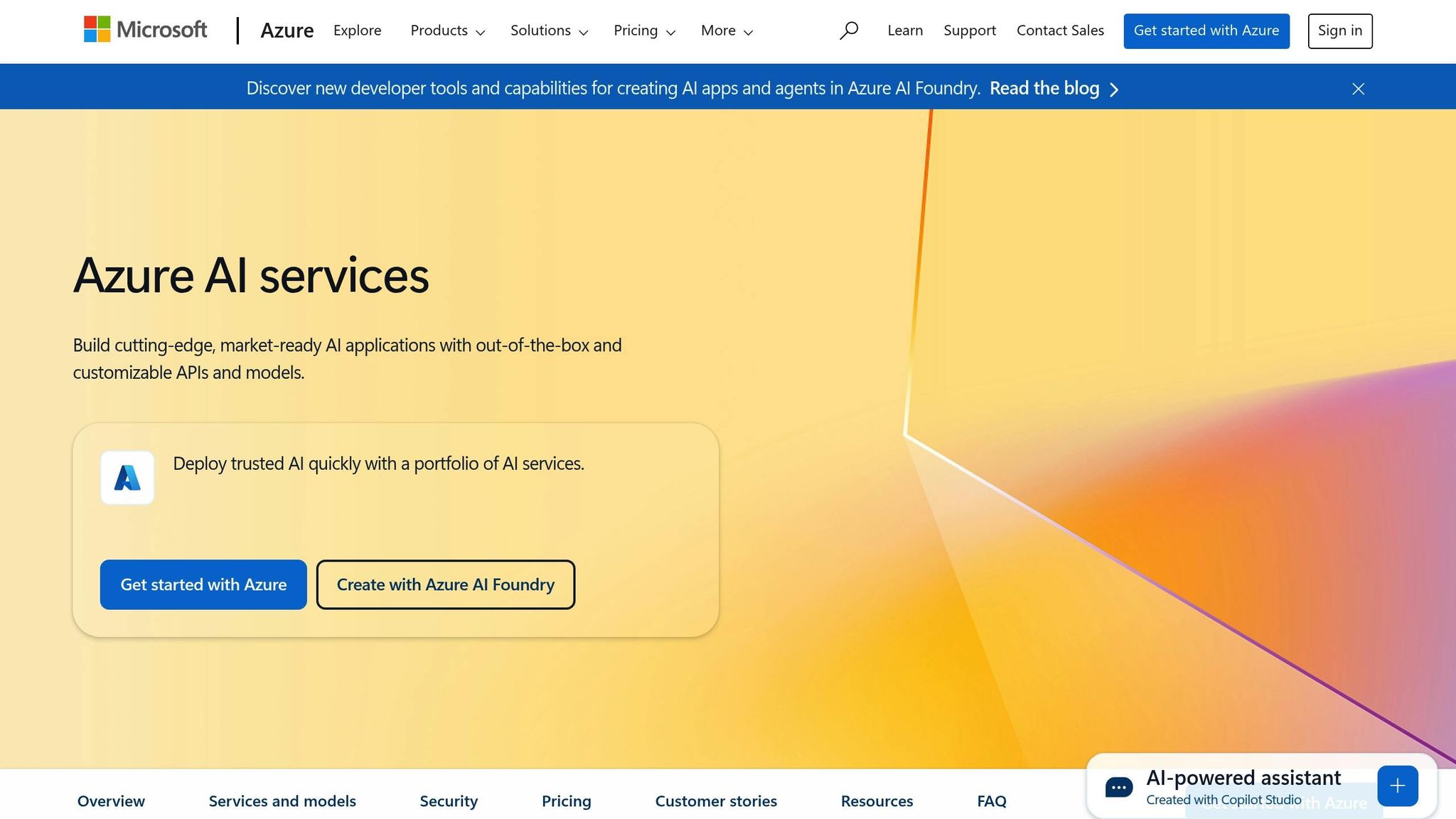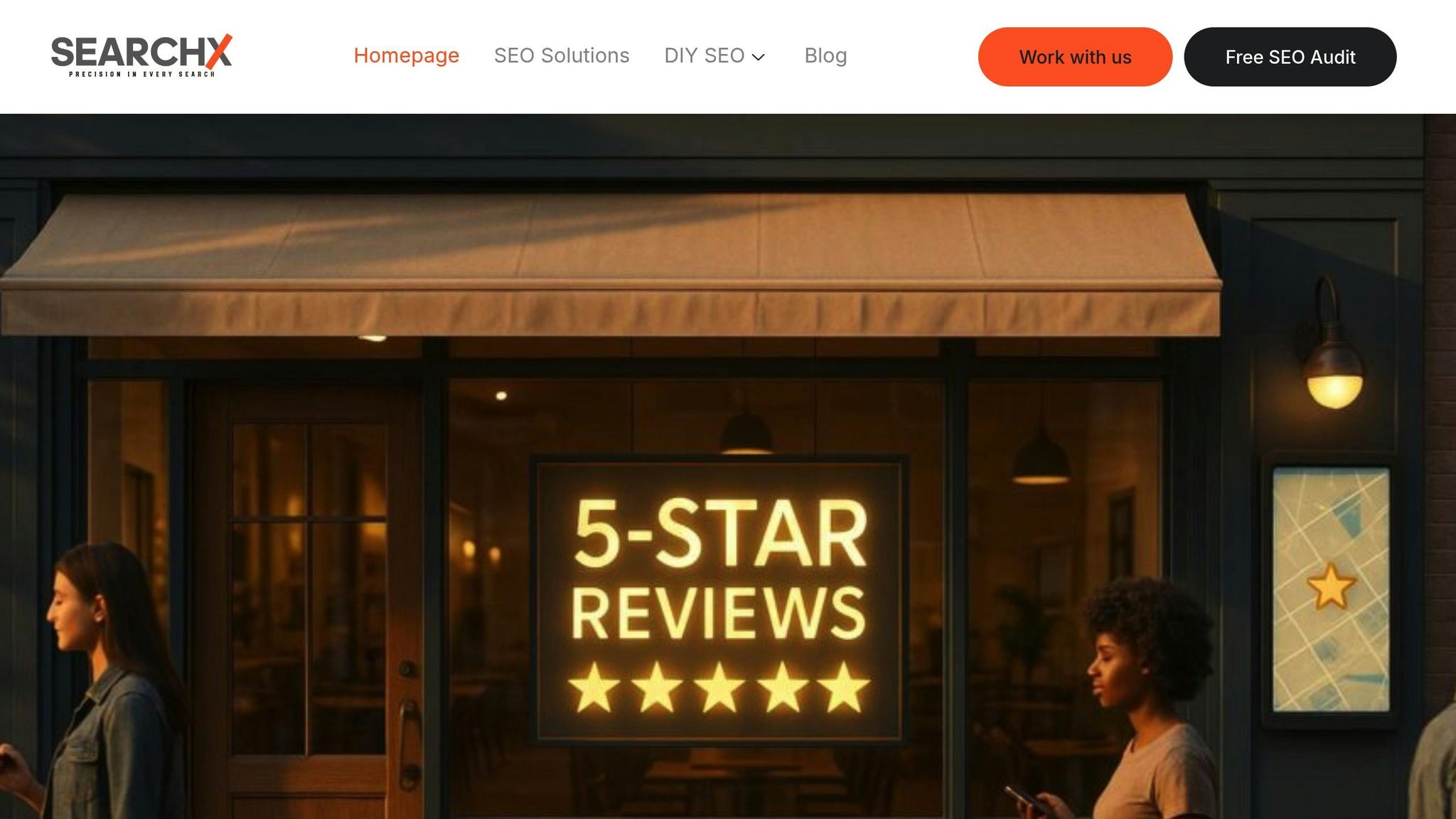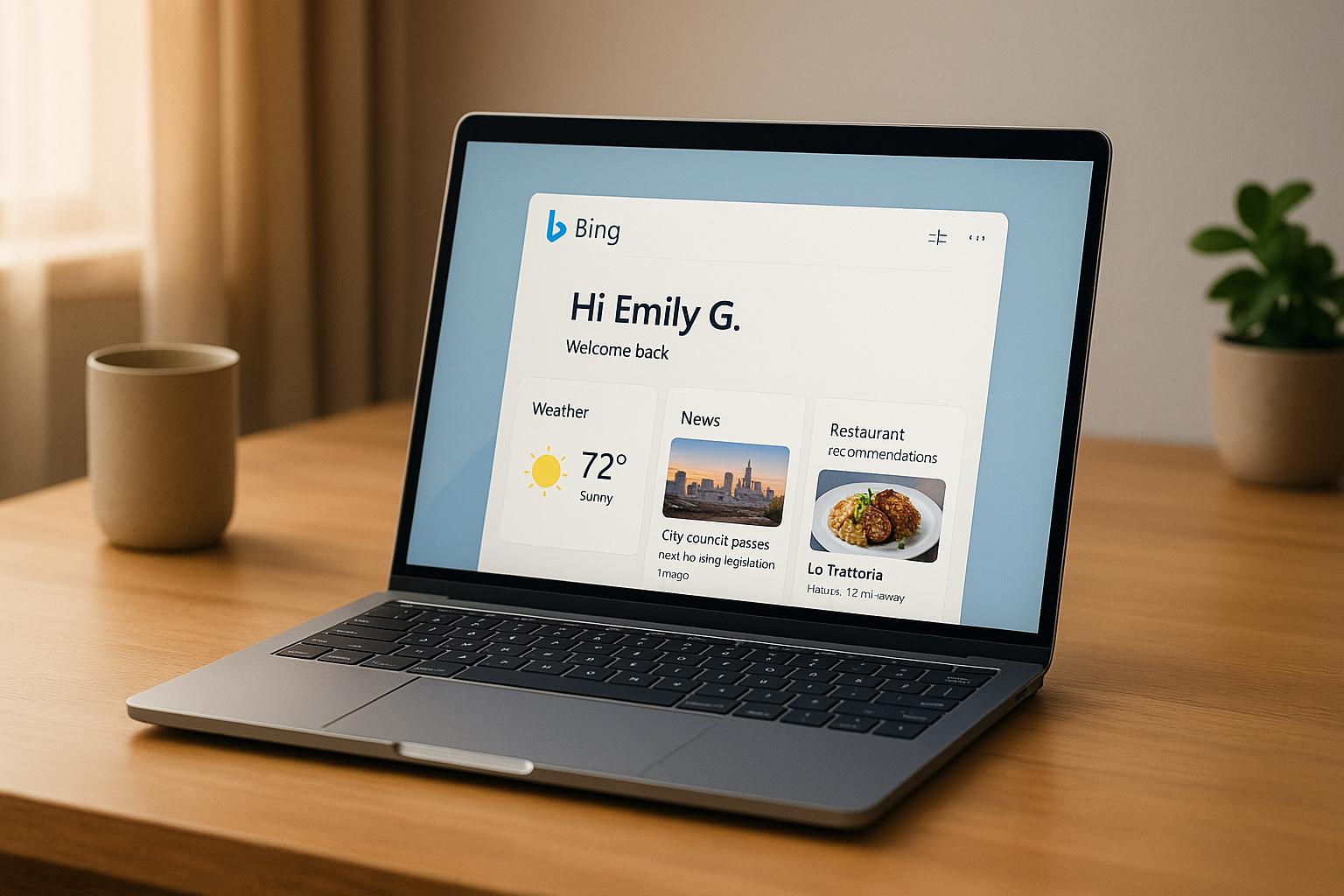Bing’s AI transforms search by making it more tailored and user-focused. Here’s how:
- Contextual Search Results: Bing uses data like search history, location, language, and device type to deliver results that match your intent. For example, searching "pizza" on your phone may show nearby restaurants, but on a desktop, it might prioritize recipes.
- Generative AI Integration: Tools like GPT enhance search by providing direct answers, personalized shopping guides, and image suggestions based on your activity.
- Real-Time Updates: Bing incorporates live data, ensuring results stay current, whether you’re looking for breaking news or trending topics.
- User Intent Prediction: AI predicts what you’re looking for – even before you finish typing – by analyzing past behavior and preferences.
- Privacy Controls: Microsoft ensures user data security with features like customizable search history settings and adherence to GDPR regulations in the EU.
- Business Opportunities: Bing’s AI-driven personalization reshapes SEO, requiring businesses to focus on intent-driven content, schema markup, and conversational optimization.
Bing’s AI advancements make search more intuitive, efficient, and secure while opening up new opportunities for businesses to connect with users.
How to use Bing AI for Personalized Search Result
Key Features of Bing AI Personalization
Bing’s AI personalization brings a fresh approach to search engines, focusing on three main features that make search results more intuitive and user-centric. These features go beyond the typical keyword-based systems, offering a smarter way to understand and respond to user needs.
Real-Time Data Integration
Bing pulls in live web data to provide up-to-the-minute search results, setting it apart from static search engines. Through a process called "Grounding with Bing Search", the system incorporates real-time public web information when answering user queries.
"Grounding with Bing Search allows your Azure AI Agents to incorporate real-time public web data when generating responses." – Microsoft Learn
For instance, if you search for "top news today", Bing’s AI taps into current data to deliver accurate updates. Additionally, the platform’s "deep search" feature uses Small Language Models (SLMs) to refine the quality and relevance of web results, improving your search experience. In December 2024, Microsoft announced that these optimizations increased query processing speeds by 36%.
Bing also enhances the search process by offering real-time suggestions as you type. These recommendations adjust based on factors like freshness, your location (e.g., en-US), and language settings, ensuring the results align with your context. This dynamic approach lays the groundwork for Bing’s ability to predict user intent, which is explored next.
User Intent Prediction with AI
Building on its real-time capabilities, Bing goes a step further by predicting what users want before they even complete their queries. By analyzing past search behaviors and preferences, the system tailors recommendations and results to match your specific needs.
"ChatGPT Bing Search provides an enhanced search experience by predicting the user’s intent before entering their query into the search box." – PC Social
This predictive feature relies on advanced natural language processing (NLP) and machine learning algorithms. It doesn’t just analyze your current query but also maps detailed interaction metrics to refine its understanding over time. The result is a highly personalized search experience that feels intuitive and responsive.
Privacy Controls in Personalized Search
Despite its advanced personalization features, Bing prioritizes safeguarding your privacy. When signed into your Microsoft account, you can easily view and clear your search and chat history via the Microsoft privacy dashboard. Even if you’re not signed in, Bing allows you to manage device-associated search history through its settings.
You can also control the visibility of search content using three SafeSearch levels – Strict, Moderate, or Off – and manage data usage for personalized ads through Microsoft’s opt-out page.
Microsoft employs robust safeguards to protect user data. For instance, data from unauthenticated users is stored separately from identifiable account information. For users in the European Union, Microsoft adheres to GDPR regulations as an independent data controller.
"Microsoft does not use what you say in email, human-to-human chat, video calls, or voice mail, or your documents, photos, or other personal files to target ads to you." – Microsoft Privacy Statement
Additionally, developers using Bing Search APIs are prohibited from using search outputs to train or improve AI models. This ensures that user data remains secure while still allowing businesses to benefit from Bing’s AI tools.
How Bing’s AI Technology Functions
Bing’s ability to deliver personalized search results hinges on a well-structured AI framework. Microsoft has developed a sophisticated system that combines various AI tools and machine learning models to create a tailored and efficient search experience.
Microsoft Cognitive Services and AI Systems

The backbone of Bing’s personalization lies in Microsoft Cognitive Services, a collection of intelligent APIs that allow applications to interpret and respond to user needs in natural ways. As the Microsoft Cognitive Services Team puts it:
"Microsoft Cognitive Services enables developers to augment the next generation of applications with the ability to see, hear, speak, understand, and interpret needs using natural methods of communication."
Bing utilizes specialized Microsoft Cognitive Services accounts to gather user behavior data, which plays a crucial role in enhancing personalization.
Azure AI Personalizer takes personalization a step further by using reinforcement learning to tailor recommendations. Unlike traditional systems that offer a range of choices, Azure AI Personalizer focuses on delivering the "single best outcome" tailored to the user’s specific behavior. Additionally, Bing Custom Search allows developers to fine-tune search results by defining specific web domains and adjusting rankings. This tool leverages Bing’s advanced search backend, including its indexing and ranking capabilities. As The Bing Team explains:
"Bing Custom Search allows you to leverage the power of Bing’s globally operating search backend (i.e., index, ranking and document processing) to build a search that fits your needs."
The integration of OpenAI‘s GPT-4 model into Bing Chat, now rebranded as Microsoft Copilot, has further revolutionized search. This model enhances the platform’s conversational abilities, supports multimodal inputs (such as combining text and images), and improves reasoning capabilities, making interactions more intuitive and context-aware.
Learning from User Behavior
Bing’s personalization thrives on its ability to adapt and learn from user interactions. By analyzing user behavior, the platform refines its algorithms to deliver increasingly relevant results.
Through machine learning, Bing processes vast amounts of user data, including search queries, clicks, dwell times, and location information. These insights help build detailed user profiles, which are then used to fine-tune personalization. For instance, Bing Chat’s multi-turn conversation memory allows it to remember the flow of a single session, enabling more personalized follow-up responses. However, this memory is limited to the current session and does not carry over to future interactions.
Data analysis involves both automated systems and human oversight to ensure accuracy and improve model training. This dual approach allows Bing to better understand user preferences and habits, enabling it to recommend websites, news articles, and other content that align closely with individual interests.
Using Bing AI for Business SEO Success
Bing’s AI-powered personalization offers businesses a chance to elevate their SEO game. With over a million users signing up for the Bing AI waitlist within just 48 hours of its February 7, 2023 release, and the platform handling billions of searches monthly – capturing 9.4% of global search traffic – Bing represents a valuable yet often underestimated market for businesses.
The rise of AI-driven search has reshaped how businesses approach content optimization. Fabrice Canel, Principal Product Manager at Microsoft Bing, highlights this shift:
"AI is fundamentally reshaping search, creating a significant disruption that marketers can’t afford to ignore. As traditional SEO practices become obsolete, those who fail to adapt risk falling behind."
This evolution demands a pivot from keyword-heavy strategies to intent-driven content and conversational optimization. Businesses that embrace Bing’s AI algorithms often report higher-quality traffic, with visitors spending more time on their pages and lower bounce rates compared to other search engines. The key lies in adapting content strategies to align with these AI advancements.
Creating Content That Matches User Intent
Understanding user intent has become the foundation of effective Bing AI optimization. Unlike traditional search engines that prioritized keyword density, Bing’s AI focuses on content that directly addresses user needs. With tools like Microsoft Copilot and Generative Search, businesses must now create content that satisfies both standard ranking factors and the nuanced demands of AI-driven algorithms.
To succeed, structure your content with clarity and precision. Use question-based keywords, descriptive headers, bullet points, and schema markup to help Bing’s AI understand and rank your pages accurately. Regular updates using tools like IndexNow can speed up indexing and ensure your content remains relevant.
Generative Engine Optimization (GEO) adds another layer to the strategy. This emerging approach emphasizes creating content frequently cited by AI systems, positioning businesses as authoritative sources. Additionally, social media engagement plays a crucial role in Bing rankings. Likes, shares, and comments act as ranking signals, making social media optimization an integral part of any Bing AI strategy.
Working with SearchX for SEO Solutions

Navigating Bing’s AI-driven search personalization can be complex, often requiring expert guidance. Many businesses turn to professional SEO agencies to manage both traditional and AI-focused strategies.
SearchX specializes in crafting SEO solutions tailored to Bing’s unique AI algorithms. Their approach combines traditional SEO expertise with advanced AI optimization techniques.
- Keyword Research: SearchX goes beyond basic keyword analysis, focusing on user intent and conversational search patterns. They identify long-tail keywords and natural question phrases that align with Bing’s preferences.
- Technical SEO Audits: Their audits address Bing-specific challenges, ensuring websites are well-structured for Bing’s indexing. This includes optimizing canonical tags, redirect strategies, and mobile responsiveness – all critical for Bing’s crawler.
- Content Creation: SearchX produces in-depth, authoritative content that meets both traditional ranking criteria and AI citation requirements. Their writers craft material that seamlessly incorporates exact-match keywords while maintaining a conversational style suited for Bing’s AI environment.
- Link Building: Recognizing Bing’s emphasis on link quality, SearchX builds relationships with authoritative sources like .edu and .gov domains to boost credibility signals.
- Local SEO: Their local SEO services focus on optimizing for Bing Places for Business and leveraging social media signals. They also use Bing Webmaster Tools for ongoing monitoring, ensuring strategies adapt to changes in AI-driven search.
With 86% of companies incorporating AI into their SEO strategies and 83% reporting improved performance, partnering with an experienced agency like SearchX can help businesses avoid missteps and fully capitalize on Bing’s evolving AI capabilities.
Future Developments in Bing AI Search
Microsoft has big plans for Bing AI, aiming to transform search into a more intuitive and personalized experience.
Better User Intent Recognition
Bing’s evolution is rooted in advanced natural language processing, designed to grasp subtle nuances like slang, idioms, and context.
With Enhanced Large Language Models (LLMs) refined using Reinforcement Learning from Human Feedback (RLHF), Bing now interprets complex prompts more effectively. For instance, GPT-4 can process up to 32,000 tokens, while some competitors handle up to 100,000 tokens.
"AI systems – especially large language models (LLMs) – have made remarkable strides in understanding what users intend and in personalizing responses to individual needs." – Conrad D’Souza
Bing plans to expand on features like chain-of-thought prompting and multi-step reasoning, which help clarify vague or ambiguous queries. These advancements build on its "Deep Search" mode, enhancing session continuity and delivering more personalized assistance.
A major leap forward came with Microsoft Copilot’s "Memory" feature, introduced in May 2024. This tool allows Bing to remember user-specific details – like your favorite foods or upcoming events – and provide tailored suggestions. Users have full control over this feature via a privacy dashboard, ensuring transparency and choice. In the future, this capability is expected to grow, allowing Bing to maintain awareness across multiple search sessions.
Looking ahead, Bing aims to integrate real-time functionality. Future updates will enable Bing to generate API calls for live data, such as weather updates, stock prices, and breaking news – merging LLM insights with up-to-the-minute search results.
The push for hyper-personalization continues with tools that adapt content based on user behavior, location, and search history. By October 2024, Bing Chat introduced "page context awareness" in Microsoft Edge, allowing it to interpret the content you’re browsing and offer relevant suggestions on the spot. These advancements promise a smarter, more tailored search experience.
AI-Powered Search Security
Bing also leverages generative AI tools powered by Microsoft and OpenAI technologies like GPT. These tools enhance search results by delivering direct answers, creating personalized shopping guides, and even suggesting images based on past searches. The result? A more interactive and user-friendly search experience.
What truly sets Bing apart is its ability to adapt through real-time user engagement data. By analyzing which results you click, how long you stay on certain pages, and how you refine your queries, Bing continuously fine-tunes its accuracy. Over time, this means your searches will align more closely with your habits and preferences.
Another standout feature of Bing’s AI is its semantic understanding. It recognizes synonyms, abbreviations, and related terms, ensuring your results are relevant – even if your phrasing isn’t exact. For example, searching "NYC" will intuitively bring up results for New York City. This nuanced language processing ensures every search feels precise and aligned with your needs.
Conclusion: AI’s Impact on the Future of Search
Bing’s AI-powered personalization marks a major transformation in how we interact with search engines. The data paints a clear picture: with tools like Copilot and Bing, the path to purchase has been reduced by 30%, and chat-based shopping interactions have driven a 194% increase in immediate purchases. These figures highlight how AI is reshaping user behavior and driving measurable business results.
The nature of search is shifting quickly. The rise of conversational search allows users to engage naturally, receiving tailored responses that consider context, intent, and personal preferences. This trend is particularly appealing to younger generations, like Gen Z and millennials, who rely on AI-driven search tools for quick answers to troubleshooting, how-tos, and product research.
Bing’s ongoing AI advancements showcase how search is becoming more dynamic and customized. For businesses, this shift brings both challenges and opportunities. Traditional SEO tactics are no longer enough. Companies must now adapt to AI-driven search by implementing strategies like structuring content for AI parsing, using schema markup effectively, and creating modular content that works across multiple platforms. This is where expert guidance becomes critical, and SearchX offers tailored SEO solutions to help businesses navigate this evolving space.
Microsoft’s Rukmini Iyer captured this shift perfectly:
"AI is changing how we shop, and it’s happening faster than we expected. With Copilot and Bing, we’ve seen the path to purchase shrink by 30%. That’s not just efficiency – it’s a shift in how people make decisions."
This rapid change means businesses must act quickly to stay ahead in an AI-first search world.
The future of search isn’t about choosing between traditional and AI-driven methods – it’s about mastering both. While AI search currently accounts for just 5.6% of total search volume as of June 2025, its impact on user behavior and conversions far outweighs its market share. Embracing this hybrid approach enables businesses to lead in the evolving search landscape and thrive in an AI-driven era.
FAQs
How does Bing protect user privacy while providing personalized search results?
Bing places a strong emphasis on user privacy, offering straightforward and customizable privacy settings that make it easy for users to control their data and preferences. Features like SafeSearch are designed to filter out harmful or inappropriate content, creating a safer browsing environment.
Microsoft follows a privacy-first approach, responsibly collecting and using data to enhance personalization while maintaining user trust. This thoughtful balance allows users to enjoy tailored search results without worrying about privacy concerns.
How can businesses optimize their SEO strategies to work with Bing’s AI-powered search features?
To thrive in Bing’s AI-powered search landscape, businesses need to prioritize understanding user intent. This means focusing on conversational queries and long-tail keywords, as Bing’s AI leans heavily on context and relevance rather than strictly matching keywords. Creating high-quality content that genuinely serves user needs is key.
Using structured data – like schema markup and FAQs – can also boost visibility in AI-enhanced search results. On top of that, optimizing technical factors such as website speed, mobile responsiveness, and overall site performance is crucial. Bing places significant importance on delivering a seamless user experience, so ensuring your site runs smoothly can make a big difference.
By implementing these strategies, businesses can better position themselves in Bing’s evolving search environment.
How does real-time data integration improve Bing’s search results?
Real-time data integration enables Bing to deliver search results that are both accurate and up-to-date by pulling in the latest information from across the web. This approach helps the search engine grasp user intent more effectively, offer timely updates, and keep its results fresh and relevant.
With the power of AI, Bing processes and analyzes real-time data to stay in sync with shifting trends, breaking news, and evolving user behavior. This ensures that search results are not only precise but also aligned with what users need at any given moment.




